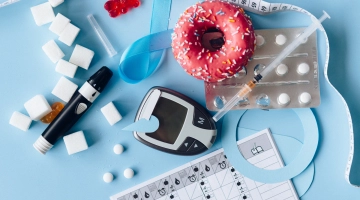The thyroid gland is a small, butterfly-shaped organ located at the front of the neck. Despite its modest size, it plays a critical role in regulating metabolism, cardiovascular and nervous system function, body temperature, mood, and even reproductive health. Disorders of the thyroid often develop silently and may be mistaken for stress, fatigue, or the natural aging process. That’s why checking your thyroid function is important—even if you have no complaints.
The Thyroid: The Core of Hormonal Balance
The thyroid produces two key hormones: thyroxine (T4) and triiodothyronine (T3). These hormones regulate the energy metabolism of every cell in the body. Their production is controlled by thyroid-stimulating hormone (TSH), which is released by the pituitary gland.
Disruption in this hormonal system can lead to a wide range of symptoms:
-
Unexplained weight changes
-
Temperature intolerance
-
Heart rhythm disturbances
-
Sleep disorders and anxiety
-
Mood swings or depression
-
Irregular menstrual cycles
-
Hair thinning, dry skin, brittle nails
The Hidden Nature of Thyroid Disorders
In many cases, thyroid dysfunction progresses with little to no symptoms. According to global estimates, about 60% of people with thyroid disorders are unaware of their condition.
In hypothyroidism (hormone deficiency), a person may feel tired, cold, gain weight, and experience poor concentration.
In hyperthyroidism (excess hormone), symptoms may include palpitations, weight loss, insomnia, and tremors. These signs are often mistaken for emotional burnout or lifestyle stress.
Who Should Get Tested — and When
You should consider thyroid screening even if you feel healthy, especially if you have:
-
A family history of thyroid disease
-
Chronic fatigue, apathy, or anxiety
-
Irregular menstrual cycles or infertility
-
Heart palpitations or arrhythmias
-
Noticeable changes in hair, skin, or nails
-
Unexplained weight fluctuations
-
Plans to conceive
What Tests Are Involved
Basic thyroid screening includes:
-
TSH (thyroid-stimulating hormone) — the key indicator
-
Free T4 and Free T3
-
Antibodies to TPO and TG — to rule out autoimmune thyroiditis
-
Thyroid ultrasound — to evaluate size, structure, and the presence of nodules
Prevention Is a Smart Decision
Screening the thyroid is not a sign of anxiety—it’s an act of self-respect and responsibility. Most hormonal imbalances are easily corrected if caught early. Early diagnosis prevents complications and helps maintain a high quality of life.
Conclusion
The thyroid can remain silent for years, even as imbalances develop. That silence should not be mistaken for health.
Just one blood test can provide critical insight into your body’s inner balance. And that balance is essential for your well-being and longevity.
Don’t wait for symptoms. Test early. It matters.





